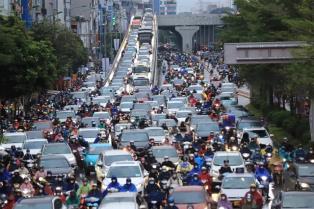The Government wants to raise the special consumption tax on vehicles with high engine displacement, according to a statement it delivered to the National Assembly recently.
 |
| Vios, one of best-selling model of Toyota Motor Vietnam in Viet Nam, has a price gone up between VND21 million to VND25 million ($933-$1,111) this year. — Photo TMV |
HA NOI (Biz Hub) — The Government wants to raise the special consumption tax on vehicles with high engine displacement, according to a statement it delivered to the National Assembly recently.
If the Government's proposal is approved by the lawmakers this year, vehicles with an engine displacement of 3,000cu.m to 4,000cu.m; 4,000cu.m to 5,000cu.m; and 5,000cu.m to 6,000cu.m will see tax increases from 60 per cent to 90 per cent, 60 per cent to 110 per cent, and 60 per cent to 130 per cent, respectively.
In particular, vehicles with engine displacement of more than 6,000cu.m will see the highest tax increase of up to 150 per cent from its current tax rate of 60 per cent.
Meanwhile, the Government has proposed that tax levied on vehicles with engine displacement of under 2,000cu.m should be reduced by between 5 per cent and 25 per cent.
The Government said high engine displacement vehicles would have heavy consumption of fuel, while their large sizes were not suitable for the country's traffic infrastructure and strained the people's income. Further, they produce high amounts of exhaust fumes, which pollute the environment.
Tax – a troublesome issue
At a seminar on special consumption tax and issues related to the tax on spare parts, which was held within the framework of the Vietnam International Motor Show in Ha Noi from October 9 to 13, auto importers proposed a reduction in special consumption tax in order to lower the prices on vehicles.
Head of the Ministry of Finance's Tax Policy Department Pham Dinh Thi said the reduction in special consumption tax on low engine displacement vehicles and tax increase for high engine displacement vehicles would create conditions for middle-income people to buy their own vehicle, thus boosting the development of the country's automobile industry.
"Projects to manufacture prioritised cars or spare parts should receive corporate income tax incentives," said Thi.
Economic expert Ngo Tri Long said the Vietnamese people had endured high taxes and fees in order to have their own car. Domestic auto users have had to bear expenses higher than that of some other ASEAN countries, where the average income is higher than that of Viet Nam.
The rate of car usage is still low, at 18 cars per 1,000 people in Viet Nam, Long said, which is much lower than that of Indonesia and Thailand, with 80 and 140 cars per 1,000 people, respectively.
At present, locally assembled cars in Viet Nam bear import tax of 10-30 per cent on spare parts, while imported completely built vehicles are taxed between 50 per cent and 70 per cent of their value.
A car has also borne special consumption taxes of 40 per cent to 60 per cent, depending on engine displacement; value-added tax of 10 per cent; and corporate income tax of 22 per cent as well.
In addition, the customers have to pay 10 different fees, including fees for registration, number plate, technology safety and road maintenance.
Of the above taxes and fees, only import tax will be reduced in line with Viet Nam's signed commitments upon entering bilateral and multilateral free trade agreements.
As for the ASEAN, Viet Nam will reduce its car-import tax to zero per cent by 2018, under the ASEAN Trade in Goods Agreement. Cars imported from EU countries such as Germany, France and Italy will have their import taxes reduced in 2018.
Under the agreement of the Trans-Pacific Partnership which covers 12 countries including the United States, Canada, Singapore and Australia, as well as Japan, Chile and Viet Nam, import tax could be reduced by 2016 and wholly eliminated by 2026.
Within this context, Long said many domestic investors would focus on the introduction and supply of imported cars, which have the advantages of competitive price and varied models, rather than developing manufacturing projects.
To prevent this situation, Long said it was necessary to reduce taxes, especially import tax and special consumption tax, to lower the selling price of vehicles and boost the automobile market's growth. As a result, domestic automakers would strengthen investment in production and the auto business and increase the rate of producing spare parts locally to help customers obtain high-quality vehicles at suitable prices. — VNS





